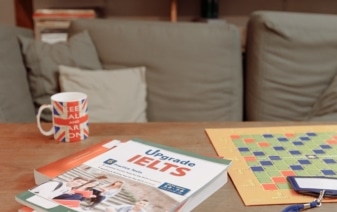Ah, the irregular verbs! They are most ESL student’s true nemesis and they’re often seen as something very difficult to learn. But irregular verbs are everywhere and you must know them if you want to learn English. In today’s post, GlobalExam will provide you with a complete guide about irregular verbs and how to master them:
→ What is an irregular verb? A complete guide.
→ How to learn irregular verbs.
→ The most important irregular verbs to know.
→ Test your knowledge about irregular verbs!
→ Our best practice tips to learn irregular verbs quickly.
→ General English: an online solution to learning English.
Now without further ado, let’s get into it!
What is an irregular verb? A complete guide
Before we begin, let’s define what an irregular verb is. In order to master them, you have to know and understand what they are. Irregular verbs are just verbs that are used with the simple past and past participle. For now, it’s easy enough. But the trick with irregular verbs is that they do not follow the common ‘rule’ when it comes to conjugating in the past tenses, they change, in their own way. To understand this, we need to look into how these tenses are normally build:
- Simple past: to use the simple past, you just need to add -ed at the end of the verb.
For example:
To dance → I danced.
To talk → I talked.
To want → I wanted
etc.
- Past participle: the past participle is almost the same, except that you have to add “has/have” before the verb +ED.
For example:
I have danced
I have talked
I have wanted
etc.
This is how you should always build your past tenses. Except for a few exceptions: the irregular verbs. As we said they do not follow the same rules and have “rules” of their own. In other words, they don’t end with the classic -ED and have their own spelling.
For example: to have → had / to do → did etc.

How to learn English irregular verbs: tips and useful information
Now that you know what they are, let’s dive into how you can learn them efficiently.
→ Look for patterns.
The irregular verbs can be sorted into different categories depending on their form:
- Some of them keep the same form, such as verbs like the verbs “set”, “hit” or “cut”.
| Infinitive | Simple past | Past participle |
|---|---|---|
| set | set | set |
| hit | hit | hit |
| cut | cut | cut |
- Some others just have the same simple past and past participle like the verbs “keep”, “buy” or “shoot”.
| Infinitive | Simple past | Past participle |
|---|---|---|
| keep | kept | kept |
| buy | bought | bought |
| shoot | shot | shot |
- Finally, some verbs change in each form like “be”, “go” or “break”
| Infinitive | Simple past | Past participle |
|---|---|---|
| be | was / were | been |
| go | went | gone |
| break | broke | broken |
If you’ve understood that they are past verbs that don’t end with the classic -ed, you should be able to spot them easily.→ Understand how they work If you’re reading a text or a sentence that you know is in a past tense and come across a verb that doesn’t end with -ED, it’s not a mistake: it’s an irregular verb. Learning about these different groups and understanding how they work will help you spot them and memorize them very quickly.
→ Make sentences
Practice them in context. Learning long lists of irregular verbs can be boring and won’t help you at all, except for making you want to drop everything. So, pick a few verbs at a time and try to write sentences with them. Pair them with adjectives in comparative and superlative forms. This will help you learn both verbs and adjectives at the same time. You can even try to write a short story that includes them. This will not only help you learn verbs in context but also help you develop your writing skills.
→ Practice makes perfect
As always, the more you will practice, the faster you will learn them. Make sentences, repeat them, put lists where you can easily see them, make flashcards, play mini games, learn a song about them… (yes, there are songs that help you learn the irregular verbs!) try to vary the activities and don’t forget that it’s better to practice on a regular basis. You can also pick up some great English grammar books if you have trouble learning.
The most common irregular verbs to know in English
Now that you learned what irregular verbs are and how you can start to learn them, here is the most important part: the irregular verbs themselves. Mind that there are more than 200 irregular verbs in the English language but some of them are not very common verbs or not used often. Here is a list of the most common one you will find, by alphabetical order: (try to pay attention to the different groups)
| Infinitive | Simple past | Past participle |
|---|---|---|
| arise | arose | arisen |
| be | was / were | been |
| beat | beat | beaten |
| become | became | become |
| begin | began | begun |
| bend | bent | bent |
| bet | bet | bet |
| bleed | bled | bled |
| blow | blew | blown |
| break | broke | broken |
| bring | brought | brought |
| build | built | built |
| burn | burnt | burnt |
| burst | burst | burst |
| buy | bought | bought |
| cast | cast | cast |
| catch | caught | caught |
| choose | chose | chosen |
| come | came | come |
| cost | cost | cost |
| cut | cut | cut |
| deal | dealt | dealt |
| dig | dug | dug |
| do | did | done |
| draw | drew | drawn |
| dream | dreamt | dreamt |
| drink | drank | drunk |
| drive | drove | driven |
| eat | ate | eaten |
| fall | fell | fallen |
| feed | fed | fed |
| feel | felt | felt |
| fight | fought | fought |
| find | found | found |
| fly | flew | flown |
| forbid | forbade | forbidden |
| forget | forgot | forgotten |
| forgive | forgave | forgiven |
| freeze | froze | frozen |
| get | got | got |
| give | gave | given |
| go | went | gone |
| grow | grew | grown |
| hang | hung | hung |
| have | had | had |
| hear | heard | heard |
| hide | hid | hidden |
| hit | hit | hit |
| hold | held | held |
| hurt | hurt | hurt |
| keep | kept | kept |
| know | knew | known |
| lay | laid | laid |
| lead | led | led |
| learn | learnt | learnt |
| leave | left | left |
| lend | lent | lent |
| let | let | let |
| lie | lay | lain |
| light | lit | lit |
| lose | lost | lost |
| make | made | made |
| mean | meant | meant |
| meet | met | met |
| pay | paid | paid |
| put | put | put |
| rea | read | read |
| ride | rode | ridden |
| ring | rang | rung |
| rise | rose | risen |
| run | ran | run |
| say | said | said |
| see | saw | seen |
| seek | sought | sought |
| sell | sold | sold |
| send | sent | sent |
| set | set | set |
| sew | sewed | sewn |
| shake | shook | shaken |
| shine | shone | shone |
| shoot | shot | shot |
| show | showed | shown |
| shrink | shrank | shrunk |
| shut | shut | shut |
| sing | sang | sung |
| sink | sank | sunk |
| sit | sat | sat |
| slay | slew | slain |
| sleep | slept | slept |
| slide | slid | slid |
| smell | smelt | smelt |
| speak | spoke | spoken |
| spell | spelt | spelt |
| spend | spent | spent |
| spill | spilt | spilt |
| spin | spun | spun |
| spit | spat | spat |
| split | split | split |
| spread | spread | spread |
| stand | stood | stood |
| steal | stole | stolen |
| stick | stuck | stuck |
| sting | stung | stung |
| strike | struck | struck |
| swear | swore | sworn |
| sweep | swept | swept |
| swim | swam | swum |
| take | took | taken |
| teach | taught | taught |
| tear | tore | torn |
| tell | told | told |
| think | thought | thought |
| throw | threw | thrown |
| understand | understood | understood |
| wake up | woke up | woken up |
| wear | wore | worn |
| win | won | won |
| write | wrote | written |

Test your knowledge about irregular verbs: basic exercises
Do you want to try some little exercises about what you’ve just learned?
Try and answer these few questions:
1.Find the past forms of these verbs:
BE?
Simple past: Past participle:
SING?
Simple past: Past participle:
TEACH?
Simple past: Past participle:
KEEP?
Simple past: Past participle:
BRING?
Simple past: Past participle:
2.What is the infinitive of these verbs in the simple past?
WROTE →
SLEPT →
UNDERSTOOD →
PUT →
LOST →
Our best practice tips to learn irregular verbs quickly
In this section, you will find 5 tips to learn irregular verbs quickly:
Tip#1: Start with a short list
Just like the 10 most common ones like be, have, do, go etc.
Tip#2: Make groups
Just like we said, they can be divided into different groups. Use these groups to make short lists that will be easier to memorize.
Tip#3: Learn every single new word with its tense forms (whether irregular or regular)
Whenever you learn a new vocabulary word, each time it is a verb, learn its infinitive as well as its past forms. If it’s a regular verb then you won’t have anything to do, if it’s an irregular verb you will have a new one in your vocabulary!
Tip#4: Memorize through games and songs
There are songs that exist on YouTube that are written with the most common irregular verbs. These songs are meant to help you memorize them while having a nice melody to remember them with. Games around the irregular verbs exist too, practise these as much as you can: it will help you learn them ten times quicker than if you just learned plain irregular verb lists.
Tip#5: Learn them in context
It is very important that you know what they mean in order to use them. Just like you should learn every vocabulary word in context, you should always learn your verbs in context too. Write sentences, create flashcards with images that represent the meaning of the verb to help you with their meaning.
General English: an online solution to learn English
Now that you know all there is to know about the irregular verbs, you can always learn more about English grammar and the other various parts of the English language with us on our General English program. Our online solution is especially made for beginners or intermediate levels, so you can either start learning English or train and improve your English. On General English, you will find:
- Academic lessons and trainings that are fun and engaging in order to keep you motivated.
- Detailed corrections that guarantee you will understand everything after each exercise
- Revisions sheets that you can access anytime you need.
Learning English on our platform will guarantee you a fun and efficient learning that will keep you motivated. What are you waiting for? Hop on with us and let’s learn English together!



